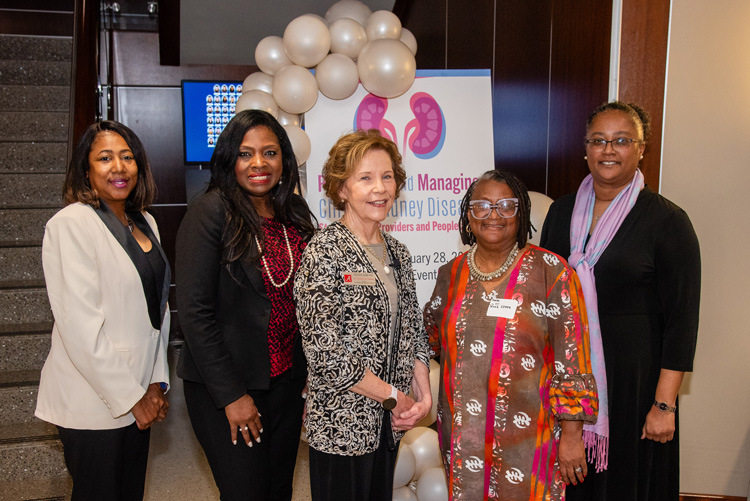What Is Chronic Kidney Disease?


Speak up. Ask questions. Take charge of your health. Your kidney health matters.
A multidisciplinary team of UA researchers led by Dr. Sharlene Newman, Executive Director of the Alabama Life Research Institute (ALRI), has been studying chronic kidney disease (CKD) in west Alabama. The team included Dr. Pamela Payne Foster, Dr. JoAnn Oliver, Dr. Chuong Bui, and Dr. Felecia Wood.

The goal of the study was to develop and implement a health literacy intervention designed to decrease the racial disparities in kidney disease. Among the primary causes of kidney disease are diabetes and hypertension, two chronic diseases that disproportionately impact the African American community. It was unclear whether people at high risk for kidney disease were aware of the link between diabetes/hypertension and kidney disease. It was also unclear how much information is communicated by primary health care providers to patients about preventing kidney disease or their risk of developing kidney disease.
Chronic kidney disease is a major health burden affecting more than 37 million Americans (1 in 7 people [Kibria.& Crispen, 2020]). Sadly, fewer than 10% of those with CKD realize they have kidney disease (Centers for Disease Control and Prevention, 2022). White males and those with a higher socioeconomic status are more likely to be aware they have CKD (Iroegbu, Lewis, & Matura, 2022). Chronic kidney disease is graded in stages 1-5, one being least serious and 5 most serious. In the early stages of CKD, people have no symptoms (Centers for Disease Control and Prevention, 2022). If untreated, CKD can progress to end stage renal disease, frequently requiring dialysis to maintain life (United States Renal Data System, 2020). African Americans with CKD are more likely to die at every stage of CKD (National Kidney Foundation, 2023). African Americans are three times more likely to develop end state renal disease than other ethnic groups (United States Renal Data System, 2020).
To accomplish the project goal, interviews and surveys were conducted with people with or at risk for CKD, primary health care providers, people on dialysis, and nephrologists (kidney doctors). We learned that many people lack knowledge about CKD, even those who have CKD or are on dialysis. We learned that primary care providers usually assess kidney function at least every year for everyone and more frequently in people with diabetes and/or high blood pressure. People on dialysis shared the challenges of living with limitations on fluids, food, and the dialysis treatments that are at least three days per week for 3-4 hours each time if done in a clinic and more frequently if done at home. Nephrologists shared their desire for all adults to be aware of risks for CKD and to ask questions of their doctors. They sought to have more time to educate patients and to spend less time navigating the challenges of obtaining medications at reasonable costs for their patients and the extensive paperwork to document care.
Health literacy is the ability to read, understand, and use health information (Healthy People 2030). Health literacy is more than general literacy. Many people who are highly educated and have high literacy levels struggle with health literacy. People must develop confidence in advocating for themselves, speaking up and asking questions about their health.

To promote improved understanding of CKD, the research team created two public service announcements and three brief videos to explain the importance of monitoring kidney health. We held a Premiere event to share those videos and audio clips with the public and held a panel discussion that included people on dialysis, a person who had received a kidney transplant, a nurse, a nephrologist (kidney doctor), and the regional director for the Alabama Kidney Foundation.
To help primary care providers quickly calculate a person’s stage of CKD and see the national guidelines for management, the team developed an app, CKD for PCPs. The app includes a map of all nephrologists in Alabama with addresses and phone numbers to allow people to select the kidney doctor that best meets their needs. The app also includes information about the importance of using plain language to talk with patients and strategies for ensuring cultural humility on the part of the provider. The app is (will soon be) available in the Apple App Store and the Google Play Store.
The team continues to actively present our work at professional conferences and to the public at health fairs and public events.
The app’s purpose is to promote early recognition of chronic kidney disease by using point-of-care staging calculator linked to evidence-based clinical practice guidelines. Additionally, the app provides a map of all nephrology practices in Alabama and names, addresses, and phone numbers for those practices to allow those needing a nephrologist to select the practice most convenient to them.
The app is intended for primary care providers but not restricted to providers.